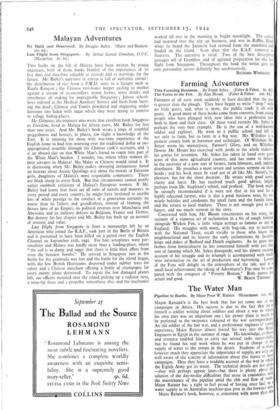Malayan Adventures
Last Flight from Singapore. By Arthur Gerald Donahue, D.F.C. (Macmillan. 8s. 6d.) Two books on the fall of Malaya have been written by young engineers, both of them books brimful of the experiences of its last days and therefore valuable as records and as warnings for the future. Mr. Bailey's narrative of retreat is full of authentic colour : the distribution of rice from a P.W.D. store to a hungry mob at Kuala Kangsar ; the Chinese rest-house keeper cycling to market against a stream of steam-rollers, motor lorries, army trucks and omnibuses all snaking for impregnable Singapore ; Johore school- boys enlisted in the Medical Auxiliary Service and fresh from bury- ing the dead ; Chinese and Tamils powdered and staggering under kerosene tins laden with sugar which they were trying to remove to village hiding-places.
Mr. Gilmour, the engineer who wrote that excellent book Singapore to Freedom, lived in Malaya for fifteen years, Mr. Bailey for less than two years. And Mr. Bailey's book wears a tinge of youthful priggishness and betrays, in places, too slight a knowledge of the East. It is amusing for those with war-time experience of the English home to find him worrying over the traditional dollar or two appropriated monthly through the Chinese cook's accounts, and it is an absurd slur on that White Man's friend to count him part of the White Man's burden. I wonder, too, where white women ill- treat servants in Malaya? No Malay or Chinese would stand it. It is distressing when Mr. Bailey makes sweeping insinuations based on hearsay about Asiatic Quislings and about the morals of Eurasian girls, daughters of Malaya's most respectable community. There are black sheep in every flock. But that circumstance cannot justify rather snobbish criticisms of Malaya's European women. If Mr. Bailey had learnt that there are all sorts of morals and manners in every period and every country, he might have hesitated to ascribe loss of white prestige to the conduct of a generation certainly no worse than its fathers and grandfathers, instead of blaming the laissez faire of an Empire, its political reverses over Manchuria and Abyssinia and its military defeats in Belgium, France and Greece. But destroy his last chapter and Mr. Bailey has built up an account of interest and value.
Last Flight from Singapore is from a manuscript left by an American who joined the R.A.F., took part in the Battle of Britain and is presumed to have been killed on a patrol over the English Channel on September nth, 1942. For him aeroplanes were per- sonalities and Malaya was hardly more than a landing-place, where " the soil is so damp and soggy that there is little blast effect from even the heaviest bombs." He arrived in Singapore just as the battle for the peninsula was lost and the battle for the island began, with the few British Hurricanes dispersed under rubber trees for safety and a Chinese merchant offering a bottle of champagne for every enemy plane destroyed. To repair the few damaged planes left, our officers motored over the island picking up a radiator here, a wing-tip there and a propeller somewhere else, and the mechanics worked till two in the morning in bright moonlight. The author had motored into the city on business, and was in Raffles Hotel when he heard the Japanese had crossed from the mainland and landed on the island. Soon after that the R.A.F. removed to Sumatra. The narrative is vivid. Two of the best descriptive passages tell of Gremlins and of agitated preparation for --the last flight from Singapore. Throughout the book the writer gets his own personality across definitely but unobtrusively.
RICHARD WINSTEDT.






















 Previous page
Previous page